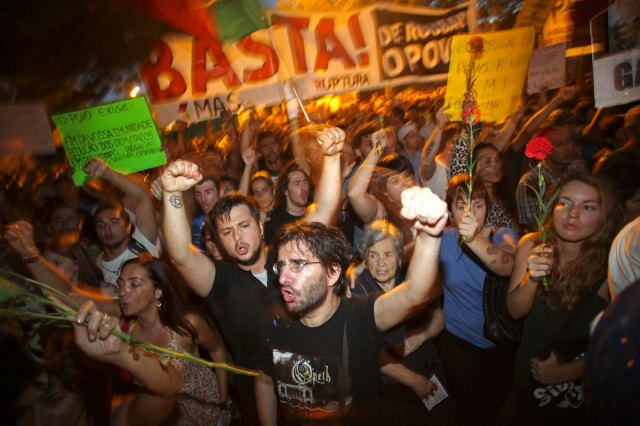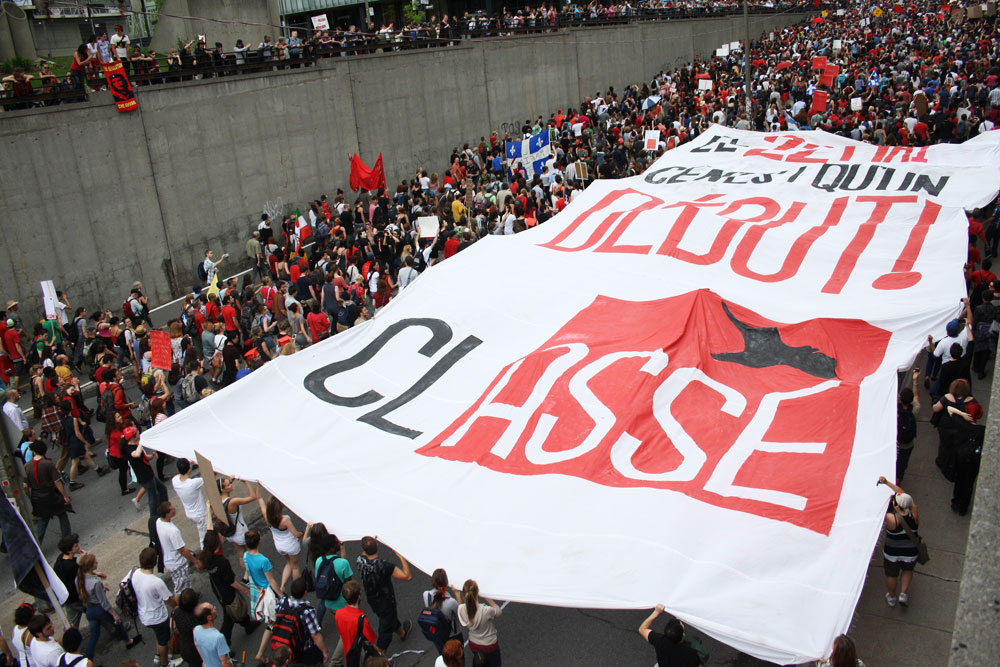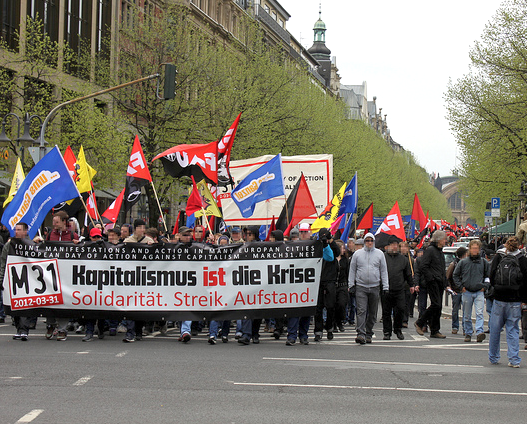Following the large protests that recently forced the Portuguese government to repeal the worst of its austerity measures many have wondered how the Portuguese movements have achieved a victory where others have failed. This personal account by Rhiannon Colvin provides some insight into the current situation.
Portugal is a country full of beauty, humour and tranquillity. A country full of nature’s paradise, Latin joy and melancholic fado. A country that was once a powerful colonial empire, yet now finds itself a mere dot in global politics. A country that once controlled and exploited and now finds itself manipulated and powerless at the hands of what is known here as the ‘Troika’, which refers to the International Monetary Fund (IMF), the European Central Bank and the European Union.
The current situation in Portugal as you may have heard from the news, is very bleak. Together with the Portuguese government the Troika is enforcing austerity measures on to the people of Portugal without any democratic consultation. These measures come in the form of policies that the government must agree to in exchange for a $78bn bailout from the Troika. They include privatisation of state services such as water and electricity, raising VAT in restaurants from 13% to 23%, cuts in government staff and wages, and most shockingly a policy that will increase employees’ social security contributions from 11% to 18% whilst simultaneously cutting the same tax for companies by 6%. This policy is seen very clearly by the population as “robbing the workers to pay the bosses” and triggered the biggest protest seen in Portugal since the fall of the dictatorship in 1974.
Within this context I arrived in Lisbon just in time to experience a very intriguing and useful event in the city: ‘Festival Avante’ a cultural and political festival put on by the Communist Party of Portugal, who still maintain a large political presence within the country, taking between 7-11% of the vote consistently in elections. This was a fascinating experience for me, to see such a huge event combining political discussion and incredible music from different genres across Portugal, as well as a brilliant communist anthem that would play at random moments throughout the festival and draw all the people together into a joyous collective dance which made me feel like I was in a different era, but that I ended up joining in with by the end. Although many of the talks were a regurgitation of the traditional communist rhetoric I have experienced with frustration in many parts of the world, namely along the line of ‘the solution to this crisis is to join the party’, what was brilliant was that most of the youth I spoke to there shared the same frustration with this line of politics, that does not change the structure but just asks you to vote for a different party, that is without empowerment, without joy, without inspiration, without real change, and were searching for something new, for a different way to do politics. The connections I made here led me very quickly into the alternative political scene within Lisbon.1
Lisbon is a beautiful and calm city, without the hustle and bustle, pomp and grandeur of other European cities. Instead its beauty is to be found in the old neighbourhoods cascading down its mountains like flowers, in free jazz and acrobatics in the park, in a sunset across the sea, on an old tram ride through the streets, or in subtle corners and crumbling buildings. The alternative political scene has a similar resonance. The network of groups is small yet full of beauty and life, the people and spaces that comprise it are hidden and calm, yet dedicated and growing. Some groups have existed for a number of years such as RDA69 a small social center that holds people’s dinners, bike workshops, cultural events and political discussions or the Transition Network that is working upon building sustainable community alternatives in urban and rural environments. However over the last year, this political scene has grown immensely and has become a large and radical presence in Portuguese political action. From the ´15th October Movement´ to the ´Indignados´, both inspired by movements in Spain in 2011 these groups have occupied squares and mobilised large demonstrations throughout 2011 and 2012, including most recently the huge demonstration I participated in on September 15th, that was the biggest protest Portugal has seen for 30 years. The form and scale of this political action is something not experienced by, and therefore very inspiring for the young generation of Portugal.
Connected too and playing an important role within this political context are new and exciting movements against unemployment. Unemployment is by no means a new issue within Portugal. Many people I interviewed had been without long-term contracted work for around 10 years and unemployment has been an issue since the beginning of the 2000´s. However it significantly increased with the financial crash in 2008, and has been growing over the past few years with unemployment now as high as 20% or 1.3 million people. Unlike in Spain and Greece, the popular response here has been slow and dominated by the unions and traditional left with calls for an increase in the minimum wage, or battles to keep jobs within government employment, however there has been very little focus on the unemployed (those who are cynical will speculate that this is because the unemployed have no money to give to the unions). Out of this frustration new groups have emerged outside of the traditional doctrine and structures, mainly Precarious Inflexives (Precarious Workers) and Movimento Sem Emprego (Social Movement for the Unemployed). My analysis was gained from participation in meetings, collective actions, individual interviews and through friendship. I will briefly outline these movements, before moving onto outlining some of my thoughts and analysis.
MSE are the movement with whom I spent a lot of time and became very close too. It is comprised of people from many different ideological backgrounds, but all with a commitment to create a space for and to fight for the rights of unemployed workers, in different and creative ways outside the party structures. The group is diverse, open and growing, with campaigns focused upon gaining minimum rights for the unemployed, creating a space for the unemployed to share and communicate with one another, gaining free transportation for the unemployed, and ultimately to form unemployed workers unions to fight collectively for the right to work. Precarious Inflexives has a different approach and is more focused upon gaining rights for those within precarious and flexible work. They have set up a very trendy space in the centre of Lisbon, which acts as the organisation headquarters, a space for political discussion and film showings, as well as a bar, a library and a music venue. This movement is a lot more linked to the Bloco de Esquerda, a left wing political party, and has had a big influence over Portuguese politics since its inception.
An important and key difference between these groups is their class composition and analysis. MSE is comprised of people who are living in a much harder reality of unemployment with limited ways out and has a very strong class analysis within their politics. The people who make up Precarious Inflexives are from a wealthier ´cultural professional´ background, their situation is by no means easy, but currently their basic livelihood is not threatened to the same extent as many in MSE and therefore they can engage in more artistic and cultural forms of resistance.
So within this reality, what were my findings and observations? What were the patterns and trends?
Firstly the Portuguese government offers very little support for the unemployed, and makes it very difficult to gain access to social security. An eligible person will get around €400 a month, which is almost impossible to live off if you have to pay rent (there are no housing benefits here). But to be eligible in the first place you have to have worked in a permanent contract for over a year (which is not a conceivable reality for most people in Portugal and means anyone coming straight out of education will not be able to access unemployment benefit). Once you have the unemployment benefit it is difficult to keep and only lasts for a maximum of two years. Therefore, as most people I interviewed were young and had not been able to find formal work since they left education, they did not have access to this benefit, and instead were living at home and surviving from what little their parents could manage. Another core strategy I observed was migration, and obvious option being migration to other more prosperous European countries, less obvious was migration to ex-colonies such as Brazil and Angola, and to rural areas and family farms. Both complete reversals of the norms of migration to colonial countries and urban centres. Finally many were trying to remain in academia and research for as long as possible, these will be the lucky, the connected, the most educated, but all were aware that this was not sustainable in the long term.
Furthermore, what was my analysis of the social movements? What is the potential for solutions and positive change to emerge out of the crisis here in Portugal?
For now the social movements and groups struggling against unemployment are focused upon growing in number and influence, in raising awareness of the issue, connecting people together, and mobilising to fight against the government for their rights. What is positive is that they are doing this is new and creative ways, outside of the traditional structures, with openness and awareness to new forms of activism and change. However in my opinion another element needs to be brought into this struggle. Alongside the fight against the violence and injustice of the government and the importance of gaining basic rights for unemployed and precarious workers is the creation of the new. Using the collective power and energy created by this crisis not just to fight for the old, but also to create new solutions and alternatives. To say yes we want work, but not just the crumbs you hand down to us, we want work that we create, that we are in control of, that we enjoy, and that is not just for the profit of a few but for the benefit of many. This in no way comes with the argument that the government is responsible for this crisis and for providing for the basic needs of the people, but from the realisation that if we don’t start creating the new reality we want out of this chaos now it will continue to get worse and worse. It comes from seeing that there is an opportunity in this mess.
Portugal is in an exciting new phase of political action, and this should not be underestimated, every person I spoke to, from young people in the park, to a middle class business man I hitched a ride with is aware of this crisis, is angry about it, and thinks radical change is needed. After being asleep and disempowered for many decades, Portugal is waking up and beginning new process of social change, and this often starts with the fight, with the anger, with the no. However I hope that this will progress into a yes, into a form of politics where people realise their collective power and begin to create alternative ways of working, interacting and living in the here and now, in a way that both challenge and inspire.
The potential exists here in Portugal, there are both mass social movements fighting the government in the cities, and small communities creating alternatives in rural areas. In my opinion these two struggles need to be brought together if truly radical and long-term change is to occur. This movement needs both the energy, strength and numbers the social movements manifest, and the inspiration, ideas and new realities the communities are creating. For me the problem of youth unemployment creates the perfect space for a synthesis of these two, as within it, it holds thousands of young, creative, active, inspiring people that have the potential to simultaneously challenge the old and create the new.
1. Here I am referring to people and groups with left wing political beliefs, who are enacting forms of social change that are more autonomous and horizontal, and outside the traditional party structures.
Originally published here.



